No matter how responsible a pet parent you are, you can still throw your dog a piece of food off the table every now and then, assuming it’s safe for them to consume in moderation. But as hard as it is to stop those adorable puppy eyes, you’ll want to think twice: According to veterinarians, there are a surprising number of foods that are toxic to dogs, even in small amounts. Keep reading to find out what’s on the no-feed list.
RELATED: Why You Shouldn’t Stop Your Dog from Lick You.
What Foods Are Poisonous to Dogs?
1. Peaches and cherries
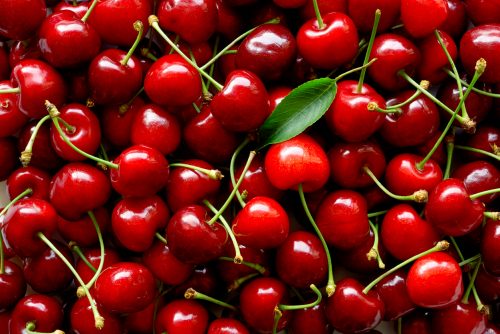

The good news: Peaches and cherries are not inherently toxic to dogs. “If your dog gets a pitted cherry or a slice or two of some peach, it should be fine,” says Matthew McCarthyDVM, a veterinarian and founder of Juniper Valley Animal Hospital in Queens, New York.
However, the pits, leaves, and stems of these fruits are dangerous. “These parts, especially the pits, contain cyanogenic glycosides,” says McCarthy.
When dogs chew on these parts, it releases cyanide, which interferes with their oxygen metabolism. “Dogs will have dilated pupils, bright red mucous membranes, panting, labored breathing, and shock,” McCarthy says.
It is also true that if they don’t chew the pits, it can cause intestinal blockage.
2. Avocado
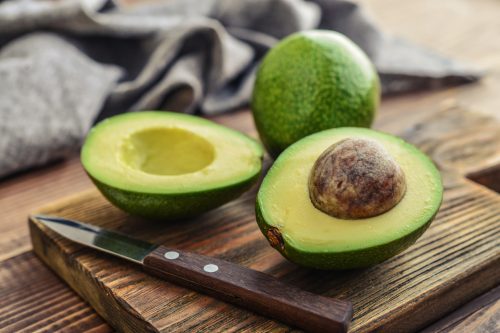

The American Kennel Club (AKC) says avocados contain persin, a fungicidal toxin, which can cause vomiting, diarrhea, and myocardial damage in dogs. The pit can also cause choking or intestinal obstruction.
3. Grapes and raisins
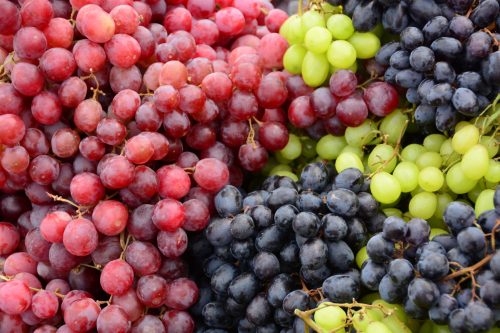

Although researchers are still not sure why this fruit is toxic to dogs, Danielle BernalDVM staff veterinarian with Wellness Natural Pet Food, says grapes and raisins “can potentially lead to rapid onset kidney damage.”
Also, Nell OstermeierDVM, veterinarian and spokesperson for Figo Pet Insurance, said that he has even seen it lead to kidney failure.
RELATED: I’m a Veterinarian and These Are 10 Things You Do That Your Dog Hates.
4. chocolate
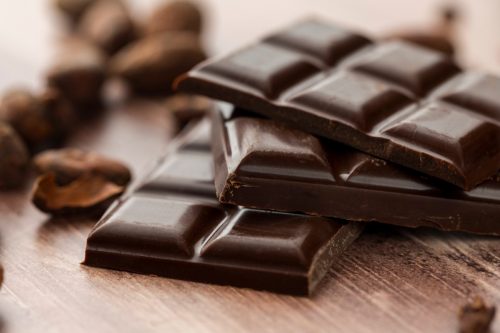

Ostermeier shared that chocolate, especially dark chocolate, contains methylxanthine, a compound that is toxic to dogs and “can cause digestive upset, dehydration, anxiety and cardiac arrhythmias (abnormal heartbeats).”
Nick Horniman, MRCVS, veterinary surgeon and founder of the online pet pharmacy MyPetsVet, notes that chocolate also contains theobromine and caffeine. “Dogs cannot metabolize these stimulants effectively, leading to potentially serious symptoms such as vomiting, rapid breathing, increased heart rate, and, in extreme cases, seizures,” explains he.
5. Coffee


The same compounds in chocolate that make dogs sick (methylxanthines) are also present in coffee—specifically, coffee grounds—as well as tea bags, soda, energy drinks, and diet pills.
“Dogs are more sensitive to caffeine than humans, and signs of overdose are similar to those seen in chocolate toxicosis,” says Jo MyersDVM, a veterinarian at pet telehealth company Vetster.
The Pet Poison Helpline states that while one to two laps of coffee won’t do any major harm to your pet, a “moderate amount” can lead to serious symptoms and can even be fatal.
RELATED: I’m a Dog Trainer and I Wouldn’t Own These 5 Breeds “Unless My Life Depended On It.”
6. Fatty bacon
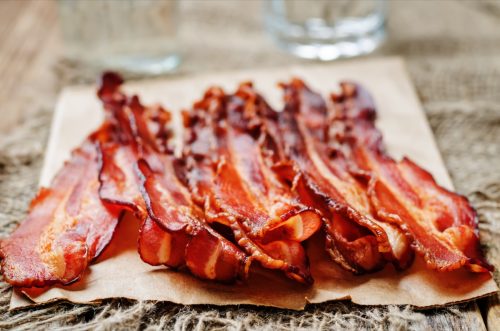

Dogs can enjoy the taste of bacon through chew toys and safe treats, however they should not consume the bacon itself. “Even in small amounts, [bacon] can cause gastrointestinal upsets and pancreatitis,” says Bernal.
It’s important to remember that dogs are smaller than people—so a slice of fatty bacon is “not a small meal” for them, Bernal adds.
7. Macadamia nuts
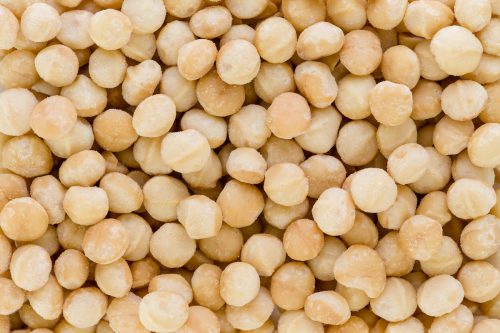

Lorna Winter, co-founder and head of the Zigzag training program, says macadamia nuts can be fatal to dogs. “The toxins in macadamias can affect your dog’s muscles and nervous system resulting in weakness, sore feet, and panting,” she explains.
Purina also says black walnuts can be toxic to dogs (although they say regular, English walnuts are usually fine).
However, even though other nuts may not be toxic, the AKC points out that they all can pose a choking hazard and are very high in fat.
8. Onion and garlic
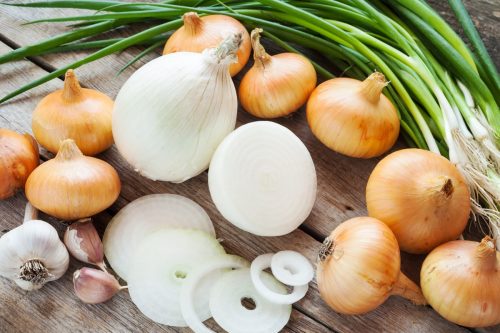

For dogs, onions and garlic are toxic in all forms: powdered, raw, dehydrated, or cooked, according to experts at Protectivity. Other alliums such as chives and leeks are also poisonous.
“They pose a threat because of their thiosulfate content, which can damage red blood cells and lead to anemia in dogs,” explains Horniman.
“Symptoms develop gradually after a few days and include dizziness, loss of appetite, pale gums/tongue, and rapid breathing,” adds Myers.
RELATED: I’m a Vet and I Won’t Buy These 5 Things for My Dog.
9. Xylitol
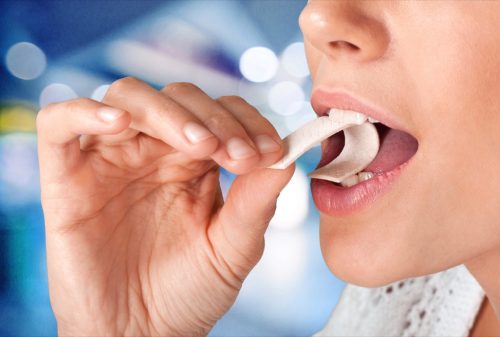

The sugar substitute Xylitol is found in foods such as lollipops, chewing gum, mints, and sometimes peanut butter, and is highly toxic to dogs.
“Xylitol causes an abnormal elevation in insulin in dogs. This puts your dog at risk for hypoglycemia (low blood sugar),” says Ostermeier, who adds that this compound can also cause digestive upset, incoordination, lethargy, seizures, and liver damage.
10. Dairy products
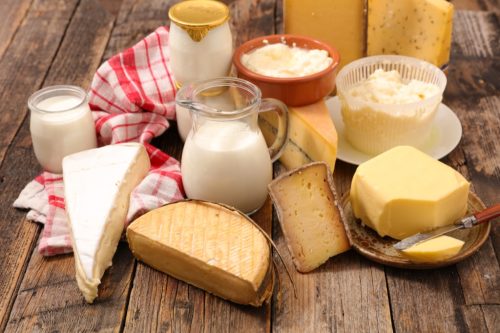

Dairy products are not technically toxic to dogs, but these foods and drinks often cause serious problems.
Puppies rely on their mother’s milk to grow and develop—and because of this, they produce an enzyme called lactase that helps them digest milk. However, as they get older and no longer need it, dogs slowly produce less of this enzyme.
“Many dogs are lactose intolerant and will experience digestive problems if they eat dairy,” note the experts at Protectivity.
While it’s not fatal for your dog to lick your ice cream cone, it can upset his stomach.
11. Bones of cooked meat
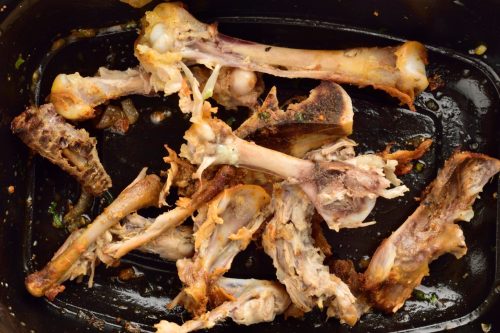

Again, leftover meat bones are not toxic, but “once they’re out of the raw state, cooked bones are more likely to break up as the dog chews on them, creating a greater risk of causing oral injury ,” explained Bernal. Winter adds that crunchy seeds can cause digestive issues.
If your dog has eaten any of these poisonous foods, it is advisable to call your veterinarian or animal poison control immediately.
For more pet advice sent straight to your inbox, sign up for our daily newsletter.


